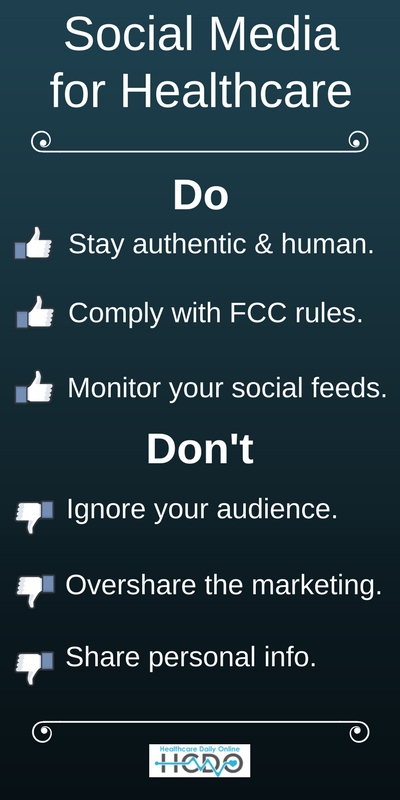More people use social media than ever. Interest in social media has increased across all age demographics, although it is particularly strong with Millennials.
That means that hospitals and other healthcare organizations have a great opportunity to use social media to reach a wide variety of people. This can prove useful in marketing, conveying important information to the public, getting feedback from patients and even sharing medical knowledge among professionals.
Healthcare professionals must be prudent about the use of social media in personal as well as professional settings. Healthcare involves regulatory and privacy issues.
It’s advisable for healthcare organizations to do the following before engaging in social media:
- Get executive leadership buy-in on social media
- Have a clear set of goals and metrics to measure if they have been reached
- Have a clear set of rules on how and when social media is used (this might require creating an inter-department committee to design the rules)
- Get approval from both legal and regulatory compliance staff for whatever is posted
- Make and implement a crisis management plan and guidelines for engagement with the public
- Determine how social platforms will be monitored and who will be responsible for it
With controls in place, social media can be used in a number of ways to benefit healthcare organizations and patients. Read on to learn how.
 Sharing Medical Information
Sharing Medical Information
Physicians, nurses and other medical professionals can network using social media, sharing the latest information on medical treatments, procedures and preventive care. With social media, healthcare workers can speak with anyone instantly around the world.
There are social networks established just for this purpose. For example, Sermo is a physician-only social media site, the “Facebook for doctors,” that allows physicians to discuss the latest developments in medical care. Entry requires proof and verification that the participant is a doctor. There are 800,000 physician members representing 96 specialties on the site.
Patient Feedback
Healthcare organizations can also use social media to get immediate feedback from patients on general issues such as their hospital experience. This information on the quality of service can help hospitals and other medical organizations make immediate changes to improve patient’s experience.
It’s important to monitor such exchanges to ensure no protected, private information is shared.
Crisis Communications
Social media can especially prove important during an emergency or crisis situation. Medical facilities can use social media such as Twitter and Facebook to immediately communicate important information to the general public. That can include issues such as capacity at a hospital, the ability to access the emergency room and passing on important information from service organizations such as the Red Cross.
Training
Some medical organizations, much like businesses in other industries, have turned to social media for use in training programs for employees. Teams might communicate with others in a different location during training in a large hospital chain via a Twitter hashtag, for example. A social media site can also provide trainees a place to go for quick answers to any questions they might have.
Marketing
As with any industry, social media provides a great opportunity for healthcare organizations to directly market their services to consumers. Posting videos of new facilities and publishing informative articles about the services they provide can help draw positive attention to a healthcare organization.
Regulatory and Privacy Issues
Working in a regulated industry in which they maintain private information on millions of people, healthcare workers must be sure to comply with the myriad regulations.
One of the primary issues is privacy – doctors, nurses and other medical professionals cannot divulge information on specific patients without explicit permission. If any patient information is made public through social media, healthcare organizations can face both government fines and private legal action.
Working within these strict perimeters, healthcare professionals can still use social media in the ways listed above. While great care needs to be taken with the nature of shared information, healthcare organizations have many opportunities to leverage social media for better service and patient experience.



 Sharing Medical Information
Sharing Medical Information





